Food shapes our planet.
Serve what matters.
Diet is the most powerful tool to fight climate change and operate safely within our planetary boundaries. With a few simple changes, we can cut emissions by over 50%.
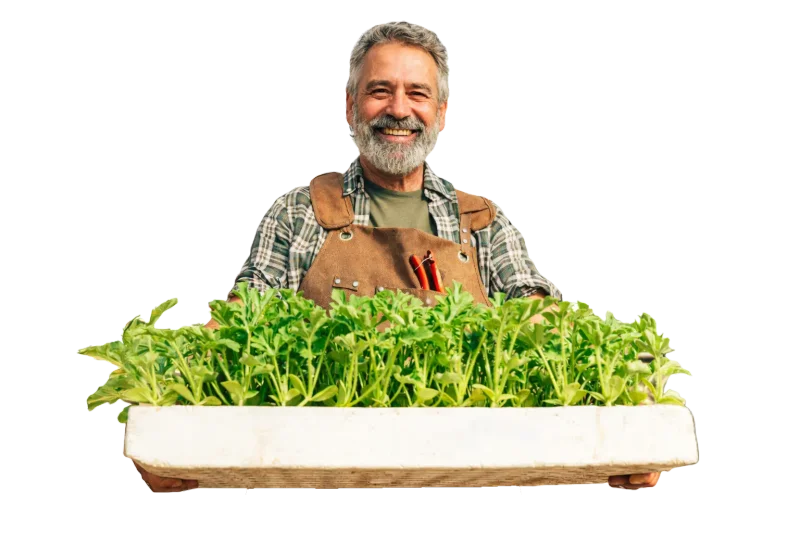
The Hidden Impact of
Our Food Choices
The majority of food production emissions (over 80%) occur during the production phase — not transport or packaging.
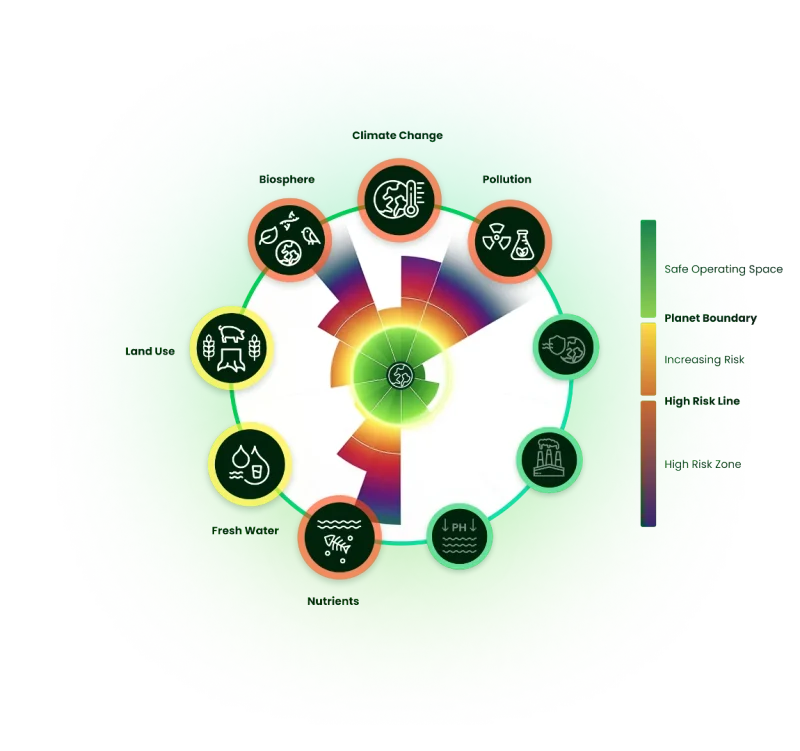
of global greenhouse gas emissions come from food production
of fresh water use goes to agriculture
of deforestation is driven by agricultural expansion
of agricultural land is used for livestock
Food systems impact 6 of 9 planetary boundaries,
and we are exceeding the limits on all 6.
Reduce food emissions by 50% with smart choices
With more than 30% of emissions coming from food, the most impactful answers to the Paris Climate Accord are hidden in our refrigerators.
Plant-based
Favor plant-based over animal products
Seasonal
Choose seasonal over heated greenhouse vegetables
Local
Select local over airfreighted goods
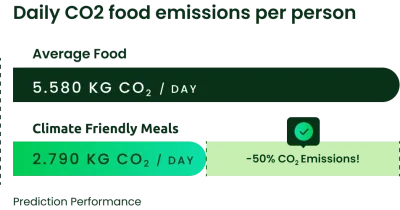
If the world went climate-friendly 3 days per week, the impact on greenhouse gas emissions would be the same as taking 16% of all cars off the streets.
Small actions have a huge effect
Food is at the heart of the climate challenge but it's also the solution.
The critical warming threshold we must stay below.
Annual human emissions (2024) — depleting the budget.
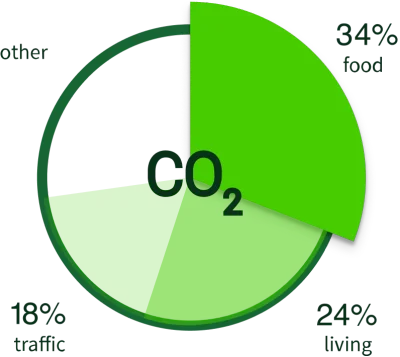
Diet shifts could add 2+ years to our climate timeline.
The future of food emissions
By 2050, food production alone could consume up to 70% of the global carbon budget if current trends continue. As the global population grows and incomes rise, more people shift to meat-heavy diets — increasing emissions even further.
Population Growth
Population expected to hit 9–10 billion by 2050
Demand Increase
Without changes, demand for high-impact foods will skyrocket, consuming up to 70% of the global carbon budget.
Solution Path
Climate-friendly diets are key to staying within planetary boundaries
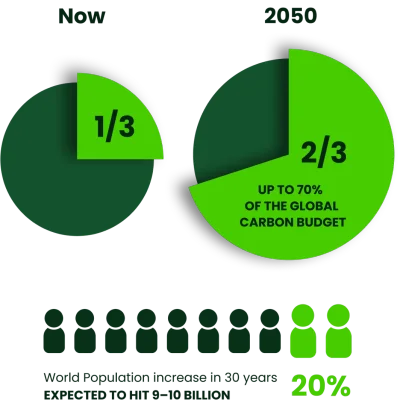
Test Your Food Impact Knowledge
Simple swaps can have massive impact. How much do you know?
How many hours of Netflix streaming equals the emissions of 1 cheeseburger?
1 kg of pork produces the same CO₂ as how many potatoes?
How many times more emissions does cheese have compared to tofu?
Farmed salmon has how many times more emissions than legumes?
Myths vs. Facts about Sustainable Eating
Separating fact from fiction in sustainable food choices.
Myth
Local and seasonal food is always the most sustainable choice.
Fact
Transport is only ~6% of the footprint. How food is produced matters far more.
Example: Spanish outdoor tomatoes often beat Swiss greenhouse tomatoes.
Myth
Organic automatically means sustainable.
Fact
Organic supports soil health, but the product type still determines the footprint.
Example: Organic beef still has far higher emissions than any plant protein.
Myth
Eating sustainably is expensive.
Fact
Plant-based diets can reduce food costs by up to 30%.
Example: A chickpea curry costs less and has lower emissions than beef.
Every meal is a chance to shape the future
Explore Eaternity's solutions to help you cut carbon, inform better choices and reduce food waste.
Eaternity Gastro
Professional kitchen solutions for sustainable menu planning.
- Track CO₂ emissions per dish
- Menu labels and climate awards
- Customizable reports and insights
Eaternity Score
Product scoring and labeling for retailers and brands.
- Environmental scores for products
- Consumer-facing labels
- API integration for scale
Eaternity Forecast
Predictive analytics for food waste reduction.
- AI-powered demand prediction
- Reduce waste by over 25%
- Built for large operations
Deep Dive: Critical Topics
Explore detailed information on greenhouse gases, water systems, biodiversity, climate timelines, sustainable diets, circular economy, and measurement science.
Essential Knowledge for Food System Transformation
Environmental Systems & Impact
Sustainable Food Systems
Science & Measurement
Carbon Benefits of Diet Shifts
Scientific research quantifying how dietary changes can extend our carbon budget and improve climate outcomes.
The Carbon Benefits Index (Searchinger et al., Nature 2018) measures how land-use changes contribute to global carbon storage capacity. The research reveals that diet choices have far greater climate implications than previously understood.
Key Finding: 125 Gigaton Budget Extension
Research from the Potsdam Institute for Climate Impact Research (Humpenöder et al., Science Advances, March 2024) found that transitioning to sustainable, flexitarian diets could extend our 1.5°C carbon budget from 500 to 625 gigatons — a 125 gigaton extension equivalent to adding 2+ years to our remaining climate timeline.
- 63-70% emission reduction possible by shifting to vegetarian/vegan diets compared to business-as-usual by 2050 (Springmann et al., PNAS 2016 — Oxford University study analyzing health and climate co-benefits of dietary change)
- 17% global dietary emissions reduction with worldwide EAT-Lancet planetary health diet adoption (Li et al., Nature Climate Change, August 2024 — analyzing 140 food products across 139 countries)
- 43% reduction in climate mitigation costs by 2050 with healthy diet transitions (Humpenöder et al., Science Advances 2024)
- 39% less carbon dioxide removal technology needed with dietary shifts (Humpenöder et al., Science Advances 2024)
- 0.7-8 Gt CO₂-eq/year technical mitigation potential from dietary changes by 2050 (Intergovernmental Panel on Climate Change Special Report on Climate Change and Land, Chapter 5)
- 7 Gt CO₂-eq/year indicative mitigation potential from sustainable healthy diets by 2050, if land-use change and reforestation are included (Intergovernmental Panel on Climate Change Sixth Assessment Report)
Project Drawdown ranks plant-rich diets as a "Highly Recommended" and "Emergency Brake" solution — one of the fastest, most cost-effective climate actions available, avoiding 1.4-2.8 Gt CO₂-eq per year while actually saving money.
Sources: Springmann et al. 2016 (PNAS) | Li et al. 2024 (Nature Climate Change) | Humpenöder et al. 2024 (Science Advances) | IPCC SRCCL Chapter 5 | Project Drawdown
Contact Our Science Team
Get in touch with our researchers and scientists to discuss methodology, collaborations, or technical questions.
Technical Documentation
Access our comprehensive knowledge base with detailed documentation, APIs, and implementation guides.
